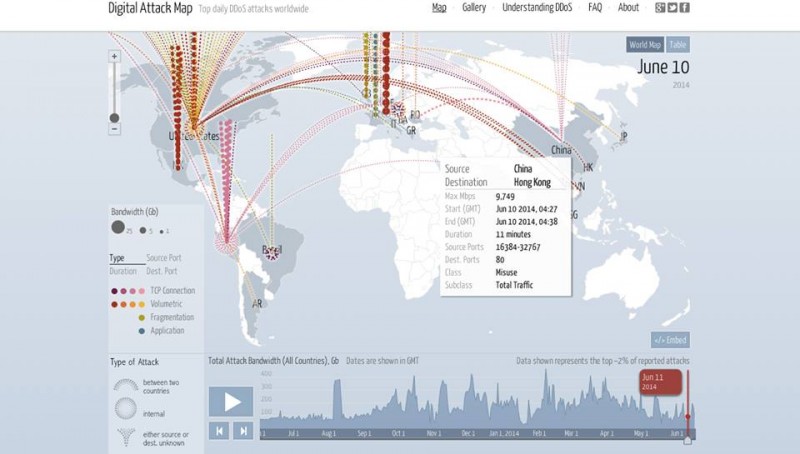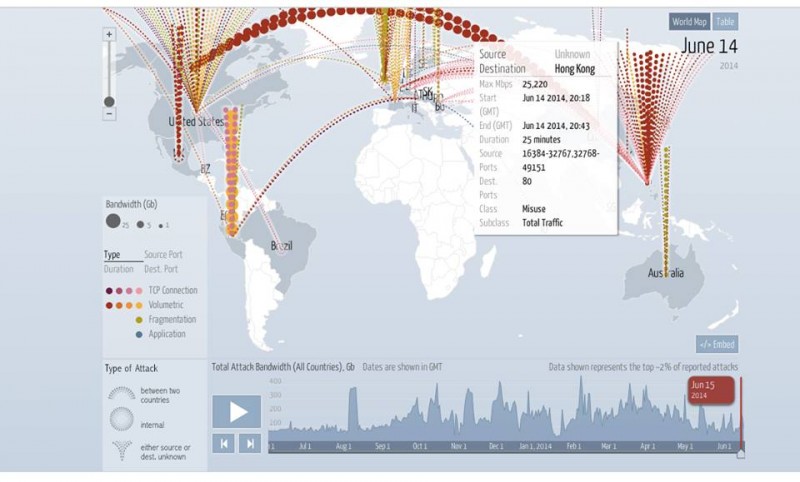Hong Kong
On the eve of a referendum about voting rights this week, Hong Kong’s digital voting platform was hit by a massive DDoS attack. Today is the first of three days of voting for Hong Kong citizens, who will decide whether to offer universal suffrage, seen as a move that would weaken the influence of Beijing-sponsored candidates. Now in its fourth day, the DDoS attack is being called “one of the largest and most persistent DDoS attacks in the history of the Internet” by the company CloudFlare, which has been contracted to defend the voting platform and said that the attack reached a scale of 300Gb per second today. The attack is widely suspected to be the work of pro-Beijing groups, who oppose the referendum. The vote is unofficial, meaning that its results will have “no legal effect,” according to a statement by the Hong Kong government. More than 200,000 ballots have already been cast. For more information, see our earlier post on the attacks.
Iraq
The spiraling violence as the Islamic State of Iraq and Syria (ISIS) sweeps across Iraq prompted the Maliki government to cut Internet access in the country. Last Friday, sites including Twitter, Facebook, and YouTube were blocked across the nation. Two days later, the government issued orders to ISPs to shut down all Internet access in five of the country’s 19 provinces. The Atlantic reported this week that ISIS is particularly effective at using “gaming Twitter” to push its message and recruit new followers. More information can be found in our blog post about the shutdown.
Pakistan
Twitter announced that it would no longer censor tweets deemed “blasphemous” by the government. In a statement, the company said that it had “re-examined the requests and, in the absence of additional clarifying information from Pakistani authorities, [had] determined that restoration of the previously withheld content is warranted.” Though hailed as a victory for freedom of expression in Pakistan, the decision drew attention to Twitter’s murky takedown policy, which it has declined to make public.
Tajikistan
Reporters Without Borders reported that YouTube has been blocked and Google is only partly accessible in Tajikistan since June 12. Blocking has surged in the country over the last two years, usually around times of political tension like last November’s presidential election. On Monday, a Global Voices contributor and the publication’s former Central Asia Editor, Tajik-born Alex Sodiqov, was detained while conducting academic research in the eastern part of the country. The government has allegedly shown him on national television “in an apparent attempt to discredit both him and an opposition politician.” More information can be found in our earlier blog post on Sodiqov’s detainment.
United Kingdom
Revelations emerged this week that the British government has been using a legal loophole to scrutinize its citizens’ social media communications. Charles Farr, director general of the Office for Security and Counter Terrorism, revealed that posts and other communications made on platforms like Facebook and Twitter are considered “external communications” because they’re routed through foreign companies. This means that even missives traded by British nationals in the UK, who are usually afforded significant privacy protections, are fair game for government interception—without a warrant—because the data leaves British shores before reentering.
#imweekly is a weekly round-up of news about Internet content controls and activity around the world. To subscribe via RSS, click here.


